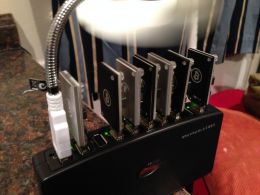
New Malware Mines Bitcoin via Victims' CPUs and GPUs
Palo Alto Networks has discovered a unique malware family that can mine bitcoins via the victim’s CPUs and GPUs. The malware, called PWOBot, is completely written in Python and compiled via PyInstaller, generating a Microsoft Windows executable, according to a Palo Alto Networks posting. The malware has affected European organizations, mainly in Poland. A Polish file-sharing service delivers the malware. The malware can download and execute files, log keystrokes, execute Python code and mine bitcoins via the affected computers’ GPUs and CPUs. The malware has been noticed as far back as....
Related News
A Taiwanese hardware company has warned its clients about a targeted crypto mining attack against their storage devices. The malware infects NAS devices connected to the internet by installing a crypto-miner named Dovecat. Threat Actors Install Malware That Illicitly Mines Bitcoin According to the advisory revealed by Bleeping Computer, the malware mines bitcoin (BTC) on NAS devices without alerting its operators. The company elaborates on the findings: QNAP NAS can become infected when they are connected to the Internet with weak user passwords. The malware campaign launched by unknown....
SophosLabs has published a report on how hackers are distributing a new mining malware across the web. The Mal/Miner-C malware hijacks a computer and allows malicious individuals to mine Monero with the victim’s processing power. SophosLabs Researches a New Exploit That Borrows CPU Power to Mine Monero. A new paper, authored by Attila Marosi, details how....
The top (left) and bottom (right) of the Block Erupter USB. Bitcoin mining has evolved rapidly over the past few years. From CPUs, to GPUs, to FPGAs, to ASICs, the most up-to-date and powerful miners change constantly. When the first ASIC miners were shipped to customers in early 2013, miners became incredibly more powerful than before. Among the first ASIC miners announced was the Block Erupter USB: a small USB (Universal Serial Bus) that mines for Bitcoins. A History. Block Erupter USBs were first announced by friedcat on May 4th, 2013, on BitcoinTalk.org. They were small, portable, yet....
Dridex, the banking malware affecting thousands of computers to cause losses in tune of millions has evolved to become a bitcoin ransomware delivery platform Dridex, the well-known banking malware has been compromising computers by infecting the all prevalent macros in Microsoft Office suite. The Dridex Malware has been known to steal personal information and banking credentials after gaining access to the system disguised as an MS Word attachment received in a spam mail. The malware may now have the capability of delivering bitcoin ransomware to target computers, causing additional damage....
Bitcoin-stealing malware has drained the wallets of many unlucky victims over the years. The more valuable and understood Bitcoin becomes, the more such attacks can be expected. Common sense security practices, like not opening random links or attachments in unsolicited emails, certainly help to lower the risk of malware infection. But unless your bitcoins funds are vaulted within an air-gapped device or consigned to a paper wallet, it's hard (if not impossible) to eliminate the threat of malware entirely. Yet a cunning new web service, known as Bitcoin Vigil, employs an unsecured,....





